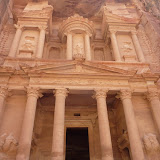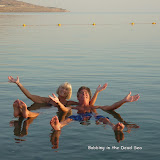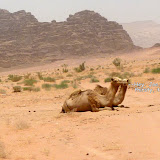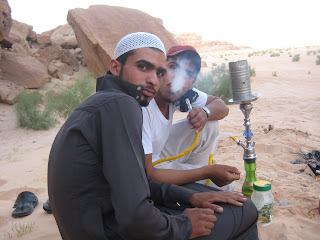We looked over Jordan and what did we see................? We actually saw and did a lot in just a few days.
Early one morning we traveled up the Egyptian Sinai Red Sea coast and crossed into Israel.
See, here's Chris:
We then taxied 20 minutes and we crossed over to Aqaba, Jordan. Here we rented a car and headed for the deserts of Jordan, specifically Wadi Rum and a Bedouin camp.
| Wadi Rum |
See Chris's magical blurb about Wadi Rum below this post
After a cool night in Wadi Rum, we headed north to Wadi Musa [Valley of Moses] and the ancient city of Petra. Petra is a 2000+ year old city carved into the rocks in central Jordan. Its beauty is beyond comparison and was made famous in the Indiana Jones and the Last Crusade--remember?
 |
| Petra |
After a few days exploring Petra and snapping again way too many photos we moved on to the Dead Sea for some bobbing and mudding. It's just what you do--really quite amazing.
 |
| Dead Sea |
We then flew overnight to Zimbabwe and off on a 3 day safari. More about all that later.
dv
********************************
CHRIS'S BLURB JORDAN
WADI RUM SUNSET, JORDAN
We are standing atop a giant swirled sandstone peak for sunset. It is around 7 pm. We look out across a desert mountain landscape where Wadi Rum is tucked into in the craggy Bedouin valley of Jordan’s ochre rock and shimmery sand, forming a nomadic quilt draping hundreds of miles. A gigantic ball of sun beams hot white as if it will refuse to set. But we aren’t fooled. We know it will soon sink behind the scrappy peaks in the distance, and then the desert will take on a quiet gilded edge as night consumes our nearby encampment. Tonight Don and I will sleep in a Bedouin tent owned by Obeid and his three sons and 5 daughters and wife. The desert camp is managed by Obeid and his sons, while the women reside miles away in a nearby village.
This afternoon for four hours, Don and I have explored the desert by 4x4 with Obeid’s son Nayeil and his friend Mohammed, two 21-year-olds attired in long clay-colored robes, heads adorned in elaborate red and white checked headwraps. They tie up their robes to their waists for maneuvering around the camp and can re-wrap their heads in exotic swirls and swooshes to block out either sandy wind or sun or flies, as they scurry to prepare a salad lunch for us with sweet onion, tomato, and cooked vegetables, accompanied by hot sweet tea brewed in a blackened kettle over the coals of a never-dying fire.
There is no cell phone reception and no Internet; we are cut off from everything. This would be fine with us under normal travel, however, a few days ago I received word from Olympia that my 87-year-old mother’s health is failing, and I would like to be closer in touch with my sisters and nieces who are at her bedside. Just a few days ago Don and I called Mag (my mom) from Dahab in Egypt, and we described camels loping in front of our hotel, the beauty of the Red Sea, and the spiced environs of our Middle East travels. Limited in her language, she oohed and awwd. She tried to say some things to us which were unintelligible, and Don commented, “Mag, are you speaking in Arabic, because we can’t understand you?!” To this she roared a big belly laugh. Then, practically overnight, we heard that she had begun her demise. I am thinking of her as we race across sand-swept vistas, knowing that she would relish these experiences because of the two years she and my father spent working in Palestinian refugee camps in 1984-86.
On our desert trek today, we have attracted a testosterone-laden driver. I had already experienced this years before in Brazil on Bahia sand dunes and hoped it had been my final chance. But no. Today there are four whole hours reserved for riding with not only one Bedouin racer, but two--- both aged twenty-one. Obeid’s family, with whom we are staying, is in charge of our desert trekking, and his son Nayeil is our driver, trading off with his best friend Mohammed, who magically appeared at lunch time with a gleeful smile and a ravishing headwrap and robe. At times we bump along a sandy or rocky road, and then Nayeil takes off wildly across the dunes without any plan at all, or so it seems to me. What about damaging this protected area, I wonder? There are draught-hardy plants flourishing here. But soon I forget as I go into survival mode and hang on to the canopy frame, bracing my feet against the opposite bench seat. We pass other Bedouin camps seemingly stranded in rocky ravines, tents strapped to the desert floor, weighted down by sand-filled bags lashed to lines. Nayeil tells us that the last time it rained was in March for 5 minutes, about 2-1/2 months ago. At times we travel over dried and cracked beds with a profusion of stubborn plants, no longer moist. After we become stuck in the sand several times, Nayeil and Mohammed exit the cab and begin letting air out of all four tires so that we can unclench ourselves. They chatter and sputter and seem totally matter of fact as they rock the jeep, then roll back, then skim forward with sand flying everywhere. Each time we free ourselves and continue our race into the thermal beige.
The boys stop so that Don and I can clamber up rocks, cross stone bridges, and have tea with other Bedouins encamped among goats, camels, and tents. It is glorious, a 95 degree day with a refreshingly hot but raspy arid breeze. Late afternoon, Nayeil lets us off along a canyon so that we can hike alone about 5 k. across the dunes and down a wash along steep cliffs. He and Mohammed will meet us about 50 minutes later, a pot of tea already brewing on the small fire they have built on the desert floor against some cliffs. Bedouin fires are tiny, constructed with remnants of the sage-like native plants growing sparsely across the lands. Nayeil has gathered pieces of spent wood throughout our trip, which he will use for brewing tea on his travels or back at the encampment. He has also brought along tiny clear-glass cups, and now pours us each a steaming glassful as we come upon him after our solitary walk. He beckons us to join him and Mohammed, cross-legged on the sand. Nayeil has me pose holding a glass of hot tea, laughing because he knows that it will turn out to be a tourist photo.
We are not just drinking tea. The boys, reclining by the fire shaded by a rocky promontory nearby, happily smoke a Sheesha pipe. Its green-colored glass bell-shaped body reflects late sunshine, accompanied by the whirring sound of water bubbles with each of their inhalations. They grin, a look I recognize as mischief from days of 3-T Adolescence. Nayeil leans in and whispers to us, “Don’t tell my father. He does not like the smoking.” I can tell Nayeil is serious.
He and Mohammed continue sharing the sheehsa, and then offer some to Don and me. It is the typical apple-flavored tobacco, a sweet, mild smoke that hardly smells like smoke at all. People say that although sheesha smoking appears benign, one session on a sheesha equates a pack-and-a-half of regular cigarettes. (We have seen thousands of sheeshas in Egypt and Jordan. Every restaurant has them waiting in glistening readiness in the outdoor beachfront pillow-laden diver hangouts on the Red Sea. You order a sheesha just like you order a coffee, and the cost is usually about 5 Egyptian pounds [US$1]. Some restaurants offer free sheeshas while you dine there.) Nayeil pours more tea, burbles from the sheesha, and leans back under late afternoon desert shadows. He is our host, but obviously enjoying this moment for himself. His sparkling eyes keep a ready watch to refill our tea glass as soon as it nears empty. The smell of hot coals and scented herby plants calms us. The dunes surround us in stillness, and no one feels the need to interrupt the space and silence of this soothing refuge. My eyes almost flutter closed as I contemplate an ant pushing grains of sand near my fingertips.
Suddenly, Nayeil leaps to his feet and yells, “My father!” I look across the tan-pillowed horizon and glimpse a black 4WD speeding along a ribbon of sand in the distance. Now I see where Nayeil has learned to drive; this rig is wasting no time. Like lightening, almost before Nayeil has finished uttering his warning, Mohammed scoops up the sheesha pipe and races down a knoll through the dunes, heading towards a large rock outcrop. I quickly survey our crime scene and call out to Nayeil, “Look!” as I point towards a metal cylinder commonly used for sheesha coals, and also at the lidded tobacco tin sitting adjacent to the fire. Nayeil abruptly heaves both the canister and tin over his shoulders into the scrub without taking his eyes off the oncoming truck. He then begins tidying up the fire, while Don and I sit by guiltily. Obeid’s magnificent truck looms upon us within a mega-second, spraying sand as it swoops over the adjacent dune and practically rolls over our fire. Instantly the cab door flies open and upon us is Obeid, the father of Nayeil, white robes flowing and wild headdress covering a handsome chiseled head. “Welcome, Christina!” he smiles and exclaims in lovely English. I feel that I should hurl myself into his arms and flee away with him in his inky truck, such glamour and excitement pour off this Bedouin! He strides over to greet us for the first time (I had previously only learned to know him via Internet when I inquired and booked our reservations.) His eyes welcome us, but perhaps to him we seem a little aloof, fearing for Nayeil and the covert operation going on behind the dusty rocky barrier.
Nayeil shows deep respect to his father as they chat in Arabic, a language that always seems forceful, guttural and somewhat intimidating when I overhear it, especially spoken by males. I do not see anything of Mohammed, no doubt camouflaged behind the desert boulders; I hardly dare to look that direction. Nor can I glance at Don, both of us feeling like guilty co-conspirators possibly wreaking havoc on Bedouin family harmony. Now I notice that in the back of Obeid’s truck, on two benches, sit six tourists who appear equally ill-at-ease and slightly surprised, having just flown over the dunes and practically sideswiped our campfire. We nod in confusion to one another, wondering each others’ nationalities, but before anyone can say a word, Obeid leaps back into his truck and guns on through the desert. Nayeil, Don and I follow the whisk of blowing sand with our eyes as Obeid streaks away across slivered tangles of powdery trails.
As soon as the truck has completely disappeared over the lump of desert, Mohammed darts out from behind the rocks, waving the glass green sheesha pipe in the air, hooting broadly. Nayeil embraces Mohammed in jubilation and yells to us, “That was lucky!” The boys hash over the events in Arabic as they put out the fire, pack the tea glasses and retrieve scattered sheesha components from the brushy dunes where Nayeil had blindly tossed them. Don and I re-board the truck (we ride on benches under an open canopy in the back, while Nayeil and Mohammed commandeer from the front of the cab, Arabic music blaring, headdresses flying out the open windows.) They now drive us hurriedly towards a site they had said would be perfect for sunset. Don and I chuckle together, thinking how universal is adolescent rebellion. And how familiar.
Just as the light begins to turn rose-amber, we scramble from the truck and claw our way up a huge outcrop of rock. To our surprise, the six tourists we had just seen in Obeid’s truck are already on top the rock as well. All are perched in reverence as a stunning sizzle of orange paralyzes us across the arid landscape. The rabid ball of orange plunges in a fiery splurge as it drills itself into the skin of sand lining the nearby hills. I have never seen such a huge and luscious sphere. It seems as though it wishes to grab us up into its mass, the white sizzle beginning already to spatter an orangey spice across the sandstone. An early evening breeze whispers to each of us and clears our heads. Don begins taking his ten-thousandth sunset photo… just as his cell phone begins ringing.
Why now? Seven people turn their heads immediately to glare at him. He is surprised, since prior to this moment, we had been unable to connect his phone anywhere in Wadi Rum. In fact, we had decided that we would be in no further contact with anyone until we left the Bedouin area. The height of the rock must have allowed us access. Embarrassed, Don moves to the back portion of our towering sandstone platform and answers the call. It is my sister, Carla. Don hands the phone over, and my sister tells me that my mother has just passed away. I glance across the horizon as she gives me more details, and I see the blazing red ball of sun melting into the sand. It is leisurely paced and painfully beautiful. Here at 7:20 pm in Jordan, it is ten hours ahead of the PNW, around 9:20 am on June 12 in Olympia, Washington.
My mother could not have planned it better. How timely that I am in Jordan, experiencing closure to a desert day looking over Middle Eastern lands where my mother had once lived for two years. As I talk with Carla, I feel the peace and healing of the desert, the dry reality of life’s beginning and end, funneled by a joyous passage bursting to Mag’s afterlife.
It does not seem lonely. Already I share this loss with new strangers by my side who also seem to sense the momentum. Later this night around the campfire, they will ask about my mother and express respect for her life. They hail from Syria, Lebanon, Jordan and Germany, travelers in Wadi Rum just as Don and I are. Soon they will join us in the tent for dinner and also for hot sweet tea on rugs beside the fire along with traditional Bedouin singing. Obeid, Nayeil, and his younger brother who sings as well accompanies them on drum, offer tenor choruses of meandering starlit chants, trading the leads and rhythms, instinctively beginning and ending each phrase of the wavering melodies. Nayeil claps his hands rhythmically and soon we join in, a musical sendoff for my mother’s journey. The enchanting Arabic motifs swirl into the starlit desert sky and I know that my mother is smiling as she is serenaded into her next dimension.











